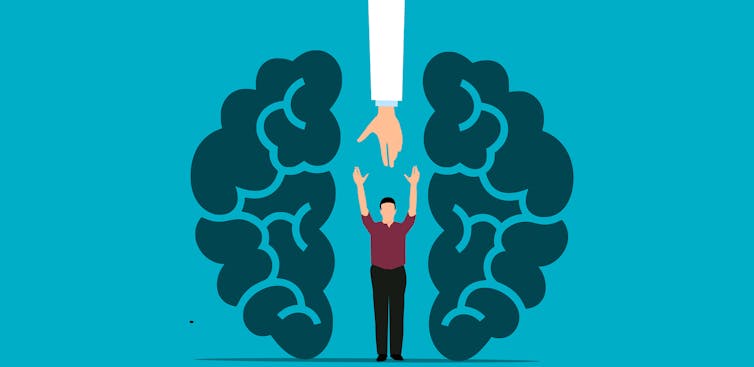
Sometimes our minds work against us. Therapy can help you understand why you think, feel, or act how you do and give you the skills you need to think, feel, or act in healthier ways. (Mohamed_hassan/Pixabay)
People go to therapy for many reasons. A challenging life event, trauma, volatile emotions, relationship problems, poor mental health: all can prompt someone to seek it out.
Whatever the reason, it can be difficult to decide when and if therapy is right for you.
If you’re reading this, now’s probably the right time. If you’re considering therapy, something is likely bothering you and you want help. Consider this your sign to reach out.
If you’re still unsure, keep reading.
Why therapy?
Sometimes, our minds work against us. Therapy can help you understand why you think, feel, or act how you do and give you the skills you need to think, feel, or act in healthier ways.
This includes helping you:
- identify, understand, and overcome internal obstacles
- identify and challenge thought patterns and beliefs that are holding you back
- improve your mental health
- cope with mental illness
- and create lasting changes to your thoughts and behaviour that can improve all areas of your life.
No one’s 20s and 30s look the same. You might be saving for a mortgage or just struggling to pay rent. You could be swiping dating apps, or trying to understand childcare. No matter your current challenges, our Quarter Life series has articles to share in the group chat, or just to remind you that you’re not alone.
Read more from Quarter Life:
- How to know when it’s time to quit therapy
- Ready for the next step in your career? Here’s how to get ready for your first leadership position
- Struggling to discuss climate change with older relatives? These 3 scenarios can help
When your mental health is suffering
Everyone experiences negative emotions in difficult situations — like sadness after a breakup or anxiety before a big life event. But when do these feelings become problematic? When you have poor mental health.
Mental health and mental illness are distinct, but related, concepts. Mental health refers to the inner resources you have to handle life’s ups and downs. You have good mental health if you enjoy life; feel connected to others; cope well with stress; and have a sense of purpose, a sense of self and strong relationships.
If you have poor mental health, it can be hard to adapt to changes like a breakup, move, loss or parenthood. Therapy can help you improve your mental health, develop resilience and maintain a state of well-being.
Mental illness refers to distressing disturbances in thoughts, feelings and perceptions that interfere with daily life. There are different kinds of mental illness, each characterized by different thoughts, feelings and behaviours.
Mental illness may feel like:
- Hopelessness — feeling stuck, unmotivated or helpless.
- Apathy — feeling uninterested in things that used to give you satisfaction or pleasure.
- Anger — feeling rage or resentment, especially frequently or disproportionately.
- Stress — feeling overwhelmed, unable to cope, unwilling to rest or like everything is hard (even if you know it shouldn’t be).
- Guilt — feeling ashamed, undeserving of good things or deserving of bad things.
- Anxiety — worrying about what has or might happen or having disturbing intrusive thoughts.
- Exhaustion — sleeping more than usual, having difficulty getting out of bed or lacking energy during the day.
- Insomnia — having difficulty falling or staying asleep.
Both poor mental health and mental illness are equally good reasons to seek therapy.
Ask yourself: Am I having trouble dealing with life challenges?
If the answer is yes, therapy might be for you.

(Shutterstock)
People often cope with the feelings listed above in different ways. Some gain or lose a lot of weight. Others might seek out or do things that are unhealthy for them, like entering a toxic relationship, engaging in dangerous activities, developing an unhealthy habit or procrastinating. Others might isolate themselves from friends and family, or catastrophize and ruminate on negative experiences.
However it manifests, mental illness often gets worse if left untreated. It can have very real impacts on your life, potentially leading to unemployment, broken relationships, poor physical health, substance abuse, homelessness, incarceration or even suicide.
Ask yourself: Is mental illness negatively affecting my functioning or well-being?
If the answer is yes, therapy might be for you.
What if therapy didn’t work before?
Many people put off going to therapy because they don’t think their problems are serious enough, but you don’t need a big, deep reason to start therapy.
Some people go to therapy to learn more about themselves. Some, to improve their skills, relationships or productivity. Others go for help reaching their goals or because they aren’t happy and don’t know why. Any of these are good reasons to start therapy, even if they don’t seem like “problems” in a traditional sense. You can go to therapy just because there’s something about yourself or your life you’d like to explore.
Therapy is a process. Whether psychotherapy works for you depends on many factors, such as time, effort and your psychologist.
There’s no quick fix for mental health. Symptoms can take weeks, months or even years to improve. Although this can be frustrating or disheartening, for therapy to work, you have to give it time.
Sometimes people go to therapy, but are skeptical or resistant. Therapy won’t work if you aren’t invested in it. For therapy to work, you have to put in the work.
Therapy is a vulnerable process, so finding a psychologist you trust and relate well with is crucial. Psychologists also have different specialities and approaches. For therapy to work, you have to find the right therapist for you.

(Shutterstock)
What if I’m not ready?
There are several reasons why now might not be the right time for you to start therapy. Maybe therapy isn’t in the budget. Maybe you have other priorities. Maybe you’re scared to relive trauma. That’s okay. Therapy can be expensive and difficult, but also rewarding. Just because now isn’t a good time, doesn’t mean there will never be a good time.
If you don’t want to start therapy, don’t. However, it can be helpful to determine why you don’t want to.
Maybe you don’t want to go to therapy because you’re worried what others might think. If so, remember that people are often more understanding than we anticipate, and there is nothing wrong with investing in your health or happiness.
If you’re struggling with your mental health, know that you’re not alone. Mental health issues are common. Having them or attending therapy does not mean there is something “wrong” with you.
Mental illness affects 970 million people and is the leading cause of disability worldwide. One in five adults and more than one in 10 children and youths have mental illness. About 15 per cent of Canadians use mental health services each year.
Don’t let stigma keep you from bettering your life and well-being. Everyone deserves to live a healthy, fulfilling life. Therapy can help you get there.![]()
Simon Sherry, Clinical Psychologist and Professor in the Department of Psychology and Neuroscience, Dalhousie University
This article is republished from The Conversation under a Creative Commons license. Read the original article.





















